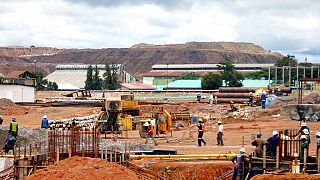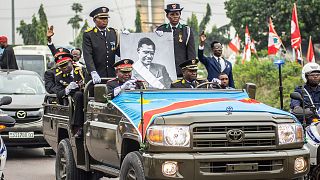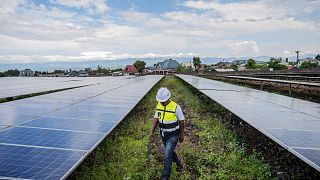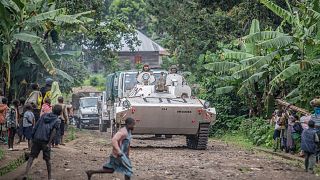Democratic Republic Of Congo
The heavy load of copper cathodes is secured, the Howo semi-trailer is ready to travel the 2,000 km or so from the mines in Haut-Katanga to the port of Dar es Salaam, from where the cargo will be shipped to Asia.
"It can take two weeks to make the trip," complains Omar Rachidi Katema, a 57-year-old Tanzanian truck driver who has just loaded 27 tons of copper plate at the Chemaf (Chemicals of Africa) plant at the Etoile mine site in Lubumbashi, in southeastern Democratic Republic of Congo.
"There are a lot of traffic jams, a lot of tolls, a lot of waiting at the border," says the trucker.
The plates (cathodes) are firmly attached in bundles, each weighing 2.3 tons. "To avoid theft" during transport, explains Eric Tshinkobo, copper manager at the plant.
At the London Metal Exchange (LME) price, a ton of copper costs about $10,000.
But if the goods are spared, the drivers are not, especially on the Congolese portion of the route. "Thieves attack us, especially on the Lubumbashi bypass road," says Omar Rachidi.
"Between here and the Zambian border (about 80 km), bandits attack us, rip off the tarpaulins, take away our money," also laments Jacob Daoudi, 45, another Tanzanian trucker, who transports 30 tons of cobalt hydroxide in his Scania.
- Ten times more expensive -
To avoid drivers carrying too much cash, operators are increasingly resorting to prepayment, via a bank, of the substantial sums to be paid at the toll booths along the road from Kolwezi, another major mining town in neighbouring Lualaba province, to Kasumbalesa, on the border with Zambia.
There are six toll booths along the 400 km of this strategic route," said Lambert Tshisueka Mutondo, president of the international road transporters of Haut-Katanga, affiliated with the Federation of Congolese Companies (FEC). This situation "hinders the flow of traffic and the profitability of the sector", he says.
He also deplores the tariffs charged: to cover these 400 km, heavy goods vehicles pay some 500 dollars, or 1,000 dollars round trip, ten times more expensive on average, according to him, than on the roads of southern Africa.
The tolls on this section are conceded by the Congolese state to a Chinese company which, in return, undertakes to ensure the construction and maintenance of road infrastructure.
The issue is sensitive and regularly debated, with one NGO recently denouncing the "leonine" nature of this type of contract. The Congolese Association for Access to Justice (Acaj) was surprised that after 14 years of concessions, the DRC still does not have a highway.
The government firmly disputes this analysis and asserts that these concessions, which it wants to extend, have enabled the construction and rehabilitation of many roads.
- Racket -
Compared to the average state of the Congolese road network, National Road 1, which crosses "greater Katanga", is good, paved and without deep potholes. But it has only two lanes, one for each direction of traffic.
Upstream of the Kanyaka tollbooth, halfway between Lubumbashi and the border, more than 200 semi-trailers are at a standstill, waiting to complete the mandatory formalities.
"In the Congo, there are red tape all the time," says Maniasi Djuma Makweba, 50, also on his way to Dar es Salaam with 35 tons of cobalt loaded at TFM (Tenke Fungurume Mining), 300 km away.
Like the other drivers, he complains about thieves, but also about the military and police. "When you go to the police to report a theft, they start by trying to extort money from you," the trucker says.
The Upper Katanga transporters' guild is calling for "patrols to deter criminals", as well as for the number of toll booths to be halved, for prices to be "capped according to the distance to be covered" and "harmonized" between the DRC and neighboring Zambia.
In fact, "by reciprocity", Zambia makes Congolese trucks pay a high price when crossing its territory and thus loses all competitiveness to South African, Zimbabwean or Tanzanian transporters. "For several years, international transport in our province has been the prerogative of foreign companies," deplores its president.
The DRC is the world's largest producer of cobalt and Africa's largest producer of copper.











01:35
Edgar Lungu's family condemns court decision to stop private burial in South Africa
00:52
South African court halts burial of Zambia’s ex-president Edgar Lungu
01:01
UN peacekeeper killed in CAR in attack by armed group near border with Sudan
00:45
Lungu funeral dispute settled between family and government
00:08
Vatican beatifies Congolese customs worker killed in 2007 for refusing bribe
01:49
UN warns of impact Sudan's humanitarian crisis is having on Chad